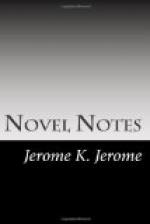“‘You must be mad,’ said my mother; ’what on earth induced you to take such a step?’
“‘My dear Emma,’ replied the lady; ’what else was there for me? You know I can’t act. I had to do something to show I was ‘an artiste!’
“We are dressed-up marionettes. Our voice is the voice of the unseen showman, Convention; our very movements of passion and pain are but in answer to his jerk. A man resembles one of those gigantic bundles that one sees in nursemaids’ arms. It is very bulky and very long; it looks a mass of delicate lace and rich fur and fine woven stuffs; and somewhere, hidden out of sight among the finery, there is a tiny red bit of bewildered humanity, with no voice but a foolish cry.
“There is but one story,” he went on, after a long pause, uttering his own thoughts aloud rather than speaking to me. “We sit at our desks and think and think, and write and write, but the story is ever the same. Men told it and men listened to it many years ago; we are telling it to one another to-day; we shall be telling it to one another a thousand years hence; and the story is: ’Once upon a time there lived a man, and a woman who loved him.’ The little critic cries that it is not new, and asks for something fresh, thinking—as children do—that there are strange things in the world.”
* * * * *
At that point my notes end, and there is nothing in the book beyond. Whether any of us thought any more of the novel, whether we ever met again to discuss it, whether it were ever begun, whether it were ever abandoned—I cannot say. There is a fairy story that I read many, many years ago that has never ceased to haunt me. It told how a little boy once climbed a rainbow. And at the end of




